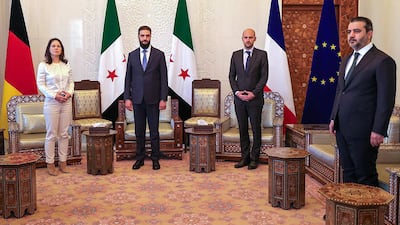Live updates: Follow the latest on Israel-Gaza
Germany should seize the transition in Syria as a chance to repair relations with the Arab world, after gaining a reputation as a staunch supporter of Israel, a former ambassador has told The National.
Syria's new Foreign Minister Asaad Al Shibani is expected in Germany for this weekend's Munich Security Conference in the latest stage of Europe's outreach to the post-Assad regime in Damascus. German Chancellor Olaf Scholz last week spoke directly to Syria's new President Ahmad Al Shara to offer help with reconstruction.
However, Berlin's standing in the Middle East has been shaken by the war in Gaza and a perception of German loyalty to Israel. "It will be an uphill battle for a while for us", said Heinrich Kreft, a former German ambassador responsible for "dialogue between civilisations", who worked extensively in the Middle East.
"The change of government in Syria was actually an opening for us to come up with a positive agenda in German-Arab relations," the retired ambassador told The National. "I would really strongly advise my government to seize this opportunity. As far as I know that’s the thinking in my ministry.
"We hope that this is really an opening for a more civil government which focuses on the reconstruction of the country but which also guarantees the security of the minorities. I think, and our government thinks, there is a big possibility for Syria to turn the page into a new, much better future. We should not miss this possibility."

The German and French foreign ministers paid a visit to Damascus last month to meet Syria's new government, which is lobbying Europe and the US to lift sanctions imposed on Mr Al Assad's regime, as it seeks foreign investment. "The economy in the future will be open," Mr Al Shibani told the World Economic Forum in Davos last month.
Mr Scholz spoke to Syria's interim president last Friday and offered "congratulations to the Syrian people" on ending Bashar Al Assad's rule, the German chancellery said. He said Germany was ready to "support Syria's reconstruction so that it becomes a free and secure home for all population groups".
Migration debate
The fall of Mr Al Assad's regime also began a debate about the future of the almost one million-strong Syrian diaspora in Germany, which goes to the polls for a general election on February 23. Right-wing parties have called for Syrians to return while former refugees warn the country is not yet safe.
"In the end it’s the people themselves who have to decide if they want to leave," Mr Kreft said. "Even those who have a job might be wanting to leave, because most likely they are the more skilled ones, the people who are probably in more need in Syria for the reconstruction of the country. In the current [German] campaign situation these are issues which are on the agenda of some of the parties and we will have to see what kind of decisions we will have after the government is founded."
He said there was also an opportunity for EU countries to forge a consensus on Syria after finding each other far apart on Israel and Gaza. Spain and Ireland recognised a Palestinian state, while others such as Hungary have taken a more pro-Israeli stance. Last year Germany was taken to the International Court of Justice by Nicaragua over its support for Israel, although it defeated an attempt to impose an embargo on arms sales.
"As we have the ceasefire agreement in Gaza, as we have a ceasefire with Hezbollah, as we have a more limited role for Iran and Russia in the region, I think there is also an opportunity for the positions of those different capitals to come closer to each other," Mr Kreft said. "Germany and Europe are prepared to play a role both in the reconstruction of Gaza, of southern Lebanon, and of Syria, and we hope that this new opening is really also seized by those actors on the ground in the region. It’s their decisions first."
A security report published by the Munich conference organisers said Mr Al Assad's downfall "undid years of Russian military efforts to prop up its ally". It said Moscow "now risks losing its air and naval bases in Syria, which are vital for its operations in the Middle East and Africa".
EU foreign ministers agreed in principle last month to ease sanctions on Syria, while warning they could "reverse course if the situation worsens". The G7 countries have tied their offer of assistance to demands that a new Syrian govern


